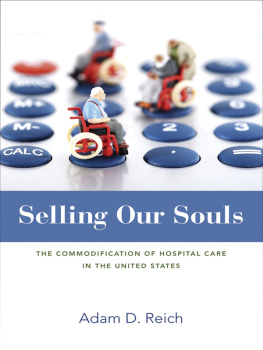
The author and publisher have provided this e-book to you for your personal use only. You may not make this e-book publicly available in any way. Copyright infringement is against the law. If you believe the copy of this e-book you are reading infringes on the authors copyright, please notify the publisher at: us.macmillanusa.com/piracy.
Contents
Part I:
Part II:
Appendix:
Love, work and knowledge are the well-springs of our life. They should also govern it.
WILHELM REICH

Preface to Third (first English language) Edition
The clinical and ethnologic material for this book was compiled between 1920 and 1930. It was rounded out by the extraordinary material Bronislaw Malinowski presented in 1930 in his comprehensive book The Sexual Life of Savages. My study of the origin of human sexual morality was written in September 1931, in the midst of the social storm that rocked the German republic before Hitlers ascendancy to power; and the strong political slant of this book stems from the experiences of that period. Nothing of what shook our social existence at that time (193045), in the political sense, has survived. However, the facts about the history of human character development have not only survived the last twenty years but have gained in consistency and social influence, which is, in the long run, the true social power.
The sharp discrepancy between the screaming of a cruel political vagrant and the calm efficiency of a study of basic problems of human nature may well serve as a warning today when a differently colored but basically similar political noise is disturbing our peaceful endeavors to learn and to do ever better in determining the path humanity has been traveling toward new forms of existence over the past few decades. In a few years the big noise will have died out again, and humanity will continue on its journey with less anguish, or so we hope.
Not a single term in sociology, once of such great significance, can today be used without creating confusion. This is due to the prostitutes in politics, the freedom peddlers who have succeeded in destroying every vestige of clear, honest thinking for the sake of mere fact-finding. To them, every term has become a tool of political cheating. In these decades we have begun to turn our attention to an understanding of mans compulsion toward subservience and fuehrer idolatry. Quite unaware of what they are doing, the fuehrers misuse the helpless mass individuals sexual and mystical longings for happiness. Accordingly, since the early 1920s social sex-economy has devoted itself to a study of this social phenomenon, which is entirely new and has never before been dealt with in sociology. Yet, quite naturally, the new type of mass-psychological thinking grew within the old frameworks of social inquiry and terminology. Nothing can better show the gradual dissolution of the old views and the emergence of the new mass-psychological aspect of social upheaval within the last thirty years than the invalidation of every term pertaining to the old terminology and the affirmation of the new mass-psychological (sex-economic) way of thinking. Thus, most of the terms that have become obsolete during the past twenty years could be eliminated without in the least changing the sex-economic context of this book. The economistic movements, which derive from Karl Marxs influence on sociology, have lost their base of operation with the emergence of a completely new type of human and social problem. Further, the great difficulties these movements have encountered after coming to power, in whatever country, reflect their helplessness in matters human and sexual. The scope of human and social problems is far deeper and broader than Marxian economics encompasses. Time marches on, and political movements remain sitting on one spot. New human strivings emerge and correct the trends in public awareness of social processes.
The problem today is no longer that there is oppression and slavery and the need for liberation from every kind of suppression. This is self-evident to everybody, conservative, liberal, and socialist alike. The problem is how people can take it all and why they irrationally follow the politicians who add to their oppression and who manage totally to exclude the crucial human problems from public debate. What is going on in people that they follow so much political nonsense is the problem of the midcentury and it will remain as the major worry in the years to come.
This book was the first step in approaching the answer to this problem. It was followed by The Mass Psychology of Fascism (1933) and The Sexual Revolution (192935). The Mass Psychology of Fascism applied the principles of individual and social sex-economy to the new movement of irrationalism among masses of average people. The Sexual Revolution investigated the processes in the first half of the twentieth century that were related to sexual and mental mass hygiene. This new social trend has been firmly rooted and is flourishing in the widespread awareness in the United States of the problem of human nature.
These two major works dealing with contemporary social sex-economy could not have remained valid for two decadesas they in fact have, up to and beyond the midcenturyhad they not been preceded by a careful study of the history of social sex-economy and mass psychology, beginning in the early twenties. The historical investigation, which was supported by work in clinics with people suffering from the plague of emotional diseases ( Character Analysis, 1st ed., 1933), introduced several crucial viewpoints into the theory of mental hygiene and the formation of human character structure: the dynamics and effects of sex-affirmative regulation of human sex-economy, the first such attempt in the history of science; the clear distinction between primary, bio-energetically determined, and secondary, culture-made drives, never drawn before; the principle of sex-economic self-regulation, as distinct from the idea of self-regulation without any bioenergetic principle (the bioenergetic law of sex-economy provided psychosociology with some natural scientific principles upon which investigations could be based); clear-cut affirmation and support of infantile and adolescent genitality; the function of the armoring of the character structure in man as fostered in patriarchal, authoritarian civilizations (cf. Character Analysis, 3rd ed., 1949).
These new principles in the theory of human character formation, simultaneously supported by and based on ethnologic, clinical, and sociological material, have begun to turn the tide in the knowledge of human natureheretofore swamped by lack of scientific principles, mysticism, moralistic prejudice, and educational brutality toward children and adolescentsinto the channels of a more rational procedure in biosocial thinking which began to emerge slowly and cautiously in midcentury, particularly in the United States.
Although early orgonomic (sex-economic) pioneer work had broken the trail toward a life-affirmative, sex-positive attitude in matters of mental hygiene in the twenties and early thirties of this century, the general stream of works in this field is still paralyzed by fear of touching the hot potato I took from the fire of an over-aged, prejudiced moralism in psychiatry and sociology and had to carry alone for two full decades. But the result was worth the strenuous effort. The turn in matters of mental hygiene is here to stay and will develop into great accomplishments. The life-affirmative, non-moralistic, rational trend in biopsychiatry and sociology quietly and determinedly bypasses what is left over from the old, over-aged, prejudiced thinking in matters of human nature.












